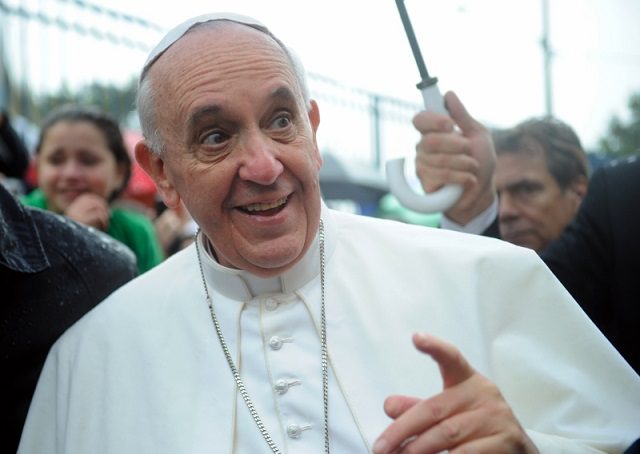Options and Respectful Speculations on the Synod on the Family, Amoris Laetitia and Practical Applications

Pope Francis at Varginha in southwest Minas Gerais state, Brazil during World Youth Day (7-27-13). Photograph from Agência Brasil, a public Brazilian news agency. [Wikimedia Commons / Creative Commons Attribution 3.0 Brazil license]
*****
As most of you who have followed my writings know, I have been a staunch defender of Pope Francis: holding that he is orthodox and has often been grossly misrepresented, for a variety of reasons: most but not all occurring through no (or little) fault of his own. To that effect, I have written a book defending him, and collected a lengthy list of articles that explain “controversies” in a light favorable to the Holy Father. In my previous two articles on the pope, I expressed my opinion that Amoris Laetitia was sufficiently clarified already (11-16-16). Then I modified my view somewhat (though not essentially), in terms of thinking that further clarification from the pope (in reply to the dubia from the four cardinals) would be helpful and indeed is necessary in our present “confused” circumstances (12-1-16).
Despite my provocative title (yes: designed — like all good titles — to draw you in!), I am far from saying that he is a heretic (!). I haven’t fundamentally changed my mind. But some people (including many — of impeccable orthodoxy — whom I respect) think he is wrong in areas related to difficult marital situations and reception of Holy Communion. I’m not sure, myself. He may be in error. At this point, I don’t think there is enough hard evidence of that. Others disagree. I think our options are roughly outlined in the following analysis, that I submit to you for your consideration. Perhaps it will help some folks work through where they stand on this increasingly troublesome controversy. I will outline the choices we have at each step of the way.
A. The Synod on the Family [October 2015] is orthodox and in line with Catholic moral tradition.
B. The Synod on the Family is heterodox and not in line with Catholic moral tradition.
I choose A.
C. Pope Francis’ Amoris Laetitia is orthodox and in line with Catholic moral tradition.
D. Pope Francis’ Amoris Laetitia is heterodox and not in line with Catholic moral tradition.
I choose C.
E. Amoris Laetitia allows no exceptions to the rule of prohibiting Holy Communion to persons in an “irregular” marital scenario.
F. Amoris Laetitia allows very rare exceptions (on a case-by-case basis) to the rule of prohibiting Holy Communion to persons in an “irregular” marital scenario. Indeed, there is precedent for this in canon law and previous papal statements.
G. Amoris Laetitia allows many exceptions (on a case-by-case basis) to the rule of prohibiting Holy Communion to persons in an “irregular” marital scenario.
H. Amoris Laetitia allows widespread, sweeping exceptions to the rule of prohibiting Holy Communion to persons in an “irregular” marital scenario (basically the Cardinal Kasper proposal).
I choose F.
I. Pope Francis’ own personal opinion on the matter is consistent with E.
J. Pope Francis’ own personal opinion on the matter is consistent with F.
K. Pope Francis’ own personal opinion on the matter is consistent with G.
L. Pope Francis’ own personal opinion on the matter is consistent with H.
Here is where I’m not sure, and where my own confusion and uncertainty lie. I suspect that his position is J (= F), but it is possible (and more and more people think) that his position is K (= G) or even (God forbid) L (= H). Thus my position, summarized, is:
A. The Synod on the Family [October 2015] is orthodox and in line with Catholic moral tradition.
C. Pope Francis’ Amoris Laetitia is orthodox and in line with Catholic moral tradition.
F. Amoris Laetitia allows very rare exceptions (on a case-by-case basis) to the rule of prohibiting Holy Communion to persons in an “irregular” marital scenario. Indeed, there is precedent for this in canon law and previous papal or magisterial statements. [see Addendum at the end]
J. Pope Francis’ own personal opinion on the matter is consistent with F. [more likely, in my opinion]
or [less likely, in my opinion]:
K. Pope Francis’ own personal opinion on the matter is consistent with G:
[Amoris Laetitia allows many exceptions (on a case-by-case basis) to the rule of prohibiting Holy Communion to persons in an “irregular” marital scenario.]
Hence, the need for clarification. If the pope provides clarification that his position is F (granting that F is true in the first place), then my set of opinions (A + C + F + J) is consistent. But if he clarifies that his position is G, then I think he is (with all due respect) in error.
Moreover, there is the altogether different practical question of how theological liberals in the Church (or dissidents or heterodox or modernists or “progressives”: choose your term) — including some of the bishops — will interpret and implement Amoris Laetitia. I touched upon this in my previous article:
It’s also true that those who have nefarious heterodox intent (as I have alluded to in the past) will exploit any confusion or (rightly or wrongly) perceived “loopholes” as a license to depart from true Catholic practice, just as they did with Vatican II and the reform of the Mass. Yet another good reason to clarify with great specificity . . .
Here’s how that works. I indeed F is the case (as I believe), the theological liberals habitually distort that in practice and implement G or H, under the pretext and pretense that any loophole becomes (after being exploited and co-opted) a giant gaping hole big enough for a truck to drive through. It becomes a (by now familiar) exercise in the “slippery slope.” If rare exceptions exist, and if this is in line with previous Catholic moral tradition and canon law, then it needs to be made crystal clear which scenarios constitute such exceptions and which do not. Otherwise, there is confusion and exploitation from those who are seeking to change unchanging Catholic moral tradition.
That’s why the pope (or at least a high-ranking Cardinal in effect speaking “for” him) needs to clarify, and the sooner the better. The longer the current confusion continues on, the worse it gets. It’s now scandalous. Soon it will be outright disastrous, leading to defections into quasi-schismatic radical reactionary Catholicism or out of Catholicism altogether (similar to an early 70s scenario of mass defection).
I’m quite willing to give the Holy Father the benefit of the doubt, and wait and see until more “certain” statements are made. Many others, I think unfortunately, are not so unassuming, and therein lies the widening troublesome situation that we now face, until this is definitively resolved. The more uncertainty we have, the more we will have undue and unedifying speculation, detraction, gossip, calumny, and slander taking place in our beloved social media.
And that is not good . . .
*****
Addendum: Possible Exceptions to Rules on Reception of Holy Communion (Cardinal Ratzinger / Pope Benedict XVI)
Cardinal Ratzinger, Congregation for the Doctrine of the Faith: Concerning Some Objections to the Church’s Teaching on the Reception of Holy Communion by Divorced and Remarried Members of the Faithful (1998):
3c. . . . Some theologians are of the opinion that the faithful ought to adhere strictly even in the internal forum to juridical decisions which they believe to be false. Others maintain that exceptions are possible here in the internal forum, because the juridical forum does not deal with norms of divine law, but rather with norms of ecclesiastical law. This question, however, demands further study and clarification. Admittedly, the conditions for asserting an exception would need to be clarified very precisely, in order to avoid arbitrariness and to safeguard the public character of marriage, removing it from subjective decisions.
[Footnote 4] During the meeting with clergy in the Diocese of Aosta, which took place 25 July 2005, Pope Benedict XVI spoke of this difficult question: “ those who were married in the Church for the sake of tradition but were not truly believers, and who later find themselves in a new and invalid marriage and subsequently convert, discover faith and feel excluded from the Sacrament, are in a particularly painful situation. This really is a cause of great suffering and when I was Prefect of the Congregation for the Doctrine of the Faith, I invited various Bishops’ Conferences and experts to study this problem: a sacrament celebrated without faith. Whether, in fact, a moment of invalidity could be discovered here because the Sacrament was found to be lacking a fundamental dimension, I do not dare to say. I personally thought so, but from the discussions we had I realized that it is a highly complex problem and ought to be studied further. But given these people’s painful plight, it must be studied further.”
PayPal donations are the easiest: just send to my email address: [email protected]. You’ll see the term “Catholic Used Book Service”, which is my old side-business. To learn about the different methods of contributing, including 100% tax deduction, etc., see my page: About Catholic Apologist Dave Armstrong / Donation Information. Thanks a million from the bottom of my heart!*













